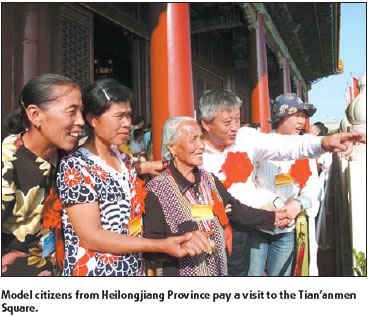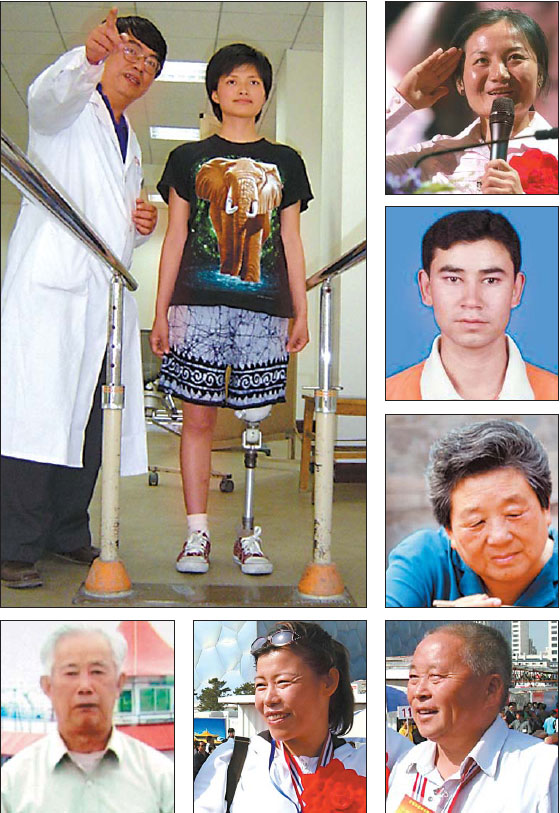Nice guys finish first
|
Center: Wen Huazhi, once a tour guide in Xiangtan, Hunan Province, who lost a leg in an accident. Model citizens (clockwise from top): Luo Yingzhen, Ani Jumar, Lin Xiuzhen, Xie Yanxin, Wu Xiujun and Wang Shuxian.Xinhua |
Most heroes are unspoken. But a national campaign launched this July sought to identify those who are moral models for the rest of the country and announce their names loudly and proudly for the world to hear.
On September 19, 53 model citizens were selected from 254 nominees, and a grand ceremony publicized their contributions to society.
These model citizens come from all walks of life and were recognized according to the criteria of five categories: Helping others, acting heroically for a just cause, being honest and trustworthy, making great contributions to society through hard work, and showing filial piety and love to their parents and other family members.
Most of the model citizens came from the everyman ranks of ordinary people, with the exceptions of scientist Zhong Nanshan, who helped stem SARS in 2003, and agricultural scientist Yuan Longping, who developed the first hybrid rice varieties in the 1970s.
The campaign to distinguish and recognize these role models was launched by the Civilization Office of the Central Committee of the Communist Party of China (CPC), All China Federation of Trade Unions, Central Committee of the Chinese Communist Youth League and All China Women's Federation.
A moral guide
Wen Huazhi first impresses people with her pretty eyes. Next, she impresses them with her confidence and positive attitude - which becomes more impressive when people hear her tragic yet heroic story.
"I hope that I could work as a guide again despite my artificial limb," she says with a smile. The 25-year-old majors in tourism management at Xiangtan University, in Central China's Hunan Province.
Wen lost her left leg in a serious traffic accident two years ago. But the last thing she was worried about during that moment was herself. Her first words upon being revived from her coma were: "Please save my tourists first; I am the guide."
At 2:30 pm on August 28, 2005, Wen was chatting with her tourists during a trip to Yan'an, in Northwest China's Shannxi Province, organized by her travel agency in Xiangtan.
But the cheerful chitchat turned to wails of terror when a coal truck smashed into their bus.
"The crash was very serious, and it seemed that every rescue effort took a long time," recalls Wan Zhongyi, who survived the crash. "Before I fell into a coma, I heard our guide's voice, telling us not to give up."
When Wen regained consciousness, she immediately noticed a shooting pain in her leg. Her tibia had snapped and was poking through the flesh of her leg. And she was trapped - sandwiched between two bus seats that had been jostled during the collision.
But Wen remembered her duty as a professional guide - to treat tourists as friends and help them in any way, at any time. She encouraged the survivors to remain conscious and wait for the rescue crew.
"Wen is a thin girl who seemed to have been hurt much worse than us, but she kept comforting us all the time," Wan recalls. "Her bravery and self-composure awakened my will to struggle against death."
The tour guide was rescued two hours later - only accepting help after she was certain every last tourist was safe. However, she paid the price of being the last one to receive medical attention: It was too late to save her leg.
"If she had received treatment a bit earlier, the amputation would have been unnecessary," says Li Jun, the doctor of Xijing Hospital in Xi'an of Shaanxi Province, who performed the operation that took most of the then 23-year-old's leg.
But Wen has no regrets.
"Yes, I did cry in the darkness, but I have never regretted my decision," Wen says. "I am just an ordinary girl who fulfilled her duty as a tour guide."
A stranger in the night
"Stop!" Ani Jumar commanded the gang of robbers. "She is my sister; leave her alone!"
The robbers were puzzled. "Your sister?" they asked him.
They were confused, because the heroic 21-year-old confronting them was obviously from the Uygur ethnic minority, while the woman they were attacking was obviously Han Chinese.
It was late at night on April 2, 2005, when Jumar and his two brothers were walking through a marketplace in Urumqi, capital of Northwest China's Xinjiang Uygur Autonomous Region. They heard a girl crying for help, and upon responding to the distress calls, they found a young lady being robbed by gangsters.
Jumar and his brothers tried to protect the girl, but they couldn't ward off the robbers. Jumar grabbed the girl's hand, and they dashed off with his elder brothers. But he was not fast enough to escape.
One of the robbers sank a 20-centimeter-long dagger in his back, causing blood to spurt from the wound. He continued fighting until he lost consciousness.
"The only thing I could think about was protecting the girl and running away with my brothers," Jumar recalls.
Other people came to the aid of his brothers, and the robbers were arrested.
Jumar was immediately rushed to the hospital .
"When he got here, he had lost a lot of blood and was in a shock," recalls Ma Jinshan, doctor of the People's Hospital in Urumqi. "The worst part was that the deep wound in the left side of his left chest was only two centimeters from his heart, which made it very dangerous to operate on him."
After three hours on the operating table, hospital staff transferred Jumar to intensive care.
Wang Li, the girl Jumar saved, sobbed as she saw the slim and pale young man lying in the hospital bed. She and her parents vowed to help Jumar recover at any cost and even began discussing plans to sell their house.
When the story was reported by media, public donations started pouring in. Soon after Jumar started making headlines, admiring strangers donated a total of 70,000 yuan ($9,300) to the hero.
After his recovery, Jumar enrolled in Xinjiang University. He was awarded as a "National Righteous Hero" and became one of the 53 moral models selected this September.
"I think I did what I should have done," he says.
And what he did has meant the world to Wang.
"We had never met before, but the moment he saved me, he became my brother," she says.
For elders and betters
Lin Xiuzhen couldn't hold back her tears when she was handed the National Moral Model award.
"I didn't see my mother in the last minutes of her life," the 61-year-old says. "That is the most regretful thing in my life."
In winter of 1999, Lin went to cook for an elderly, widowed woman in her village. Upon returning home, she found her siblings crying around her mother's bed.
"Mother, why didn't you wait me for five more minutes," Liu asked. The grief-stricken woman crawled to the bed to talk to her, but it was too late.
For the last 30 years, the ordinary villager from Nanchenzan County in Hengshui, North China's Hebei Province, has been taking care of six single, elderly people, one of whom lived in Liu's home for 26 years.

Under her care, these old people were able to live good lives until they passed away peacefully. "I feel a strong obligation to take care of helpless elderly people," Lin says.
Lin's story began 31 years ago. In 1976, a terrible earthquake hit Tangshan, a city near Hengshui. The quake had harrowing consequences for the residents of the city, and in addition to the collapse of buildings, it brought drought and hunger.
Lin, then 30, found her neighbors - an old couple without children - had nothing to eat. So she brought them food and ended up caring for them from then on.
One day, four years later, the old couple handed Lin a vile of liquid. They told their savior that on the day she came upon them, they were preparing to commit suicide by drinking the poison in the vile because of their desperation and despair.
"You gave us hope to continue living," the old couple said gratefully.
In addition to caring for elderly people, Lin has also supported 14 impoverished students' university studies, given jobs to six disabled villagers in her family's factory and adopted an abandoned baby suffering from heart disease and dementia in 1998.
This year, Lin was elected as a deputy to the 17th National People's Congress of the Communist Party of China (CPC).
Whenever she must leave her village, she will arrange for her husband and other families to look after the elderly people in her stead.
"When I was young, I watched how carefully my mother took care of my grandparents," Lin says. "I just felt the same way my mother did."
(China Daily 09/27/2007 page19)















